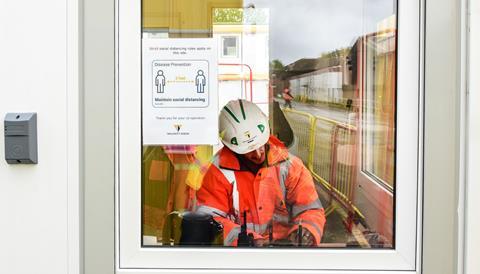Firm’s chairman promises legal action and says resposibility for cost lies with external envelope specialist and consultants
Willmott Dixon has promised to go after those firms it says are avoiding responsibility for footing the bill on cladding repair work on a mixed-use scheme which it says will cost it close to £44m.
In a sign of the wider implications for the industry over the issue of who pays for these kind of repairs following the Grenfell Tower fire five years ago, the firm promised that it would use the courts to recover what it reckons it is owed.
Chairman Colin Enticknap used his statement in the firm’s latest report and accounts, which have now been filed at Companies House, to rip into the supply chain and others on the job, accusing them of trying to “escape” paying up.

He wrote: “The huge number, complexity and growing politicisation of cladding related claims across the country has seen many culpable parties and insurers focus all their energy on escaping, reducing or deferring liability rather than facing up to their obligations.
“We face exactly that dilemma here – a building in urgent need of rectification, resident families desperate to find a solution but with no access to the Building Safety Fund and those ultimately responsible for causing the problem and funding the solution presently refusing to play their part.”
He added: “In this particular case, responsibility lies fully with the supply chain – a specialist external envelope contractor and professional consulting team – against all of whom there are legitimate claims.”
Enticknap admitted it is “likely that we will need to resort to litigation” to recover some of the £44m Willmott Dixon says it is shelling out.
He said the firm had agreed to carry out the work “at our own expense but naturally with the clear intention and expectation of being fully reimbursed that to which we are properly entitled”.
Willmott Dixon said the repair work relates to “a substantial mixed-use project completed almost 10 years ago” which it says involved building residential apartments above a retail store.
Enticknap said the scheme “in common with all other multi-storey residential schemes has had its external cladding design re-interrogated to reflect a reinterpretation of Building Regulations following the Grenfell Tower tragedy”.
It said it had initially expected the cost of repair work to be £25.7m but admitted that the extent and scope of what was required had gone up which, along with rising labour and materials costs, meant the current bill was £43.9m. It said it had deemed it “virtually certain” it would get £7.5m back from insurance claims and that “significant recoveries” were expected from other insurance polices and the supply chain in coming years.
Willmott Dixon has not named the scheme in question but, according to documents filed with Greenwich council last year, the firm submitted plans to carry out recladding work at Woolwich Central, a £250m mixed-use scheme in south-east London. The job was completed at the start of 2014.
The scheme consists of an 84,000 sq ft Tesco superstore and seven residential tower blocks, covering more than 250 flats, the largest of which is nine storeys.
The documents, prepared by architect Bickerdike Allen Partners for the contractor, said the “proposed works are a response to a change in Building Regulations that ban the use of combustible materials in ‘relevant buildings’.”
They added the scheme includes a number of now banned materials including a zinc panel system, featuring ribbons and soffits with combustible insulation, high pressure laminate panel claddings with combustible insulation and timber louvres, a curtain walling system with various infill panel types with combustible insulation. The council gave planning permission for the repair work last November.
Earlier this month, chief executive Rick Willmott said the firm had increased its overall cladding related provisions to £61m “in line with accounting standards, while we pursue recovery from those organisations ultimately responsible for designs, fire safety advice and insurance protection”.
In its results for the year to December 2021, the firm said turnover slipped 7.5% to £1.1bn with the firm returning to the black with a pre-tax profit of £11.2m – despite booking a £10.7m exceptional item relating to the cladding repair work – from a £13m loss last time, which included a £25m exceptional charge for the cladding work. The bulk of its turnover, £946m, is from its contracting arm with £156m coming from its fit-out business.
It said cash in hand and at the bank was up 15% to £113m.


























No comments yet